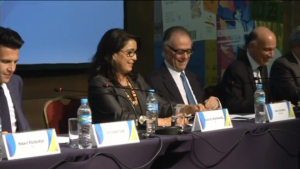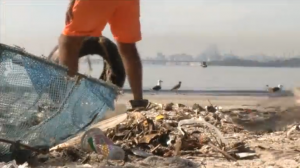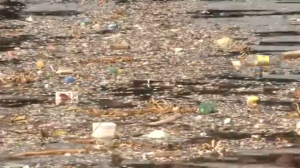 AUGUST 13 (Reuters) — Rio de Janeiro can be “proud” of the four Olympic test events held so far in the city, the head of the Rio 2016 coordinating committee said on Wednesday (August 12), as officials once again played down concerns over athletes’ safety in the city’s polluted waterways.
AUGUST 13 (Reuters) — Rio de Janeiro can be “proud” of the four Olympic test events held so far in the city, the head of the Rio 2016 coordinating committee said on Wednesday (August 12), as officials once again played down concerns over athletes’ safety in the city’s polluted waterways.
Recent tests commissioned by the Associated Press found levels of disease-causing viruses as much as 1.7 million times the level that would be considered hazardous on a Southern California beach
“I don’t think any major problem arose but I think the fine tuning is in place nowadays. Test events of course are not the Olympic Games, but I don’t think they came up, Agberto Guimaraes (Rio 2016 Director of Sports) is here and he can confirm that. I don’t think there was any major, major problem. I was happy and I was there and I was so proud of you,” Nawal el Moutawakel, chairman of the IOC Coordination Commission for the 2016 Olympics, told reporters.
El Moutawakel praised the committee’s ability to deliver “excellent” volleyball, triathlon, rowing and equestrian events, with cycling and sailing to take place later this week. 
Responding to independent reports of dangerously high levels of viruses and bacteria in the waters where sailing, swimming, rowing and triathlon events will be held, IOC officials reiterated that safety for athletes was a priority.
“Regarding the water quality I can confirm to you the IOC puts in the highest priority, the athletes. Our friends around this table are doing their utmost so that this issue of water quality is heavily dealt with so that the athletes can compete in a secure and safe environment,” said El Moutawakel.
The ocean and lagoon waters where the events will take place will meet World Health Organization standards, said Christophe Dubi, the executive director of Olympic Games for the IOC.
The municipal government said at the start of the year that it would not meet its target to reduce the amount of waste being deposited in the bay by 80 percent, as was agreed as part of the city’s Olympic bid.
Dubi, however, said that the water is being constantly monitored and its quality will improve for the Games.
“From now until the Games, this will continue, eco-barriers, eco-boats, and different measures including a new station for treatment, so all this is ongoing, so from now until the Games the quality of water will be monitored and shall improve and this movement shall not stop. It will continue until the Games and it will continue after the Games,” said Dubi.
 The comments came at the penultimate coordination meeting ahead of next year’s Games.
The comments came at the penultimate coordination meeting ahead of next year’s Games.
However, some questions still remain over Rio’s preparations, with El Moutawakel acknowledging that next Sunday’s road cycling test event had been altered because of political unrest.
The start time was brought forward and the starting point was moved to avoid clashing with planned protests against Brazilian President Dilma Rousseff.
Brazil’s economy has stalled and Rousseff’s approval rating is the lowest ever for a Brazilian leader. Hundreds of thousands of people are expected to take to the streets across the country on Sunday to call for her impeachment, but IOC official said this would not affect the Olympic Games.
The 2016 Olympic Games will begin on August 5.






